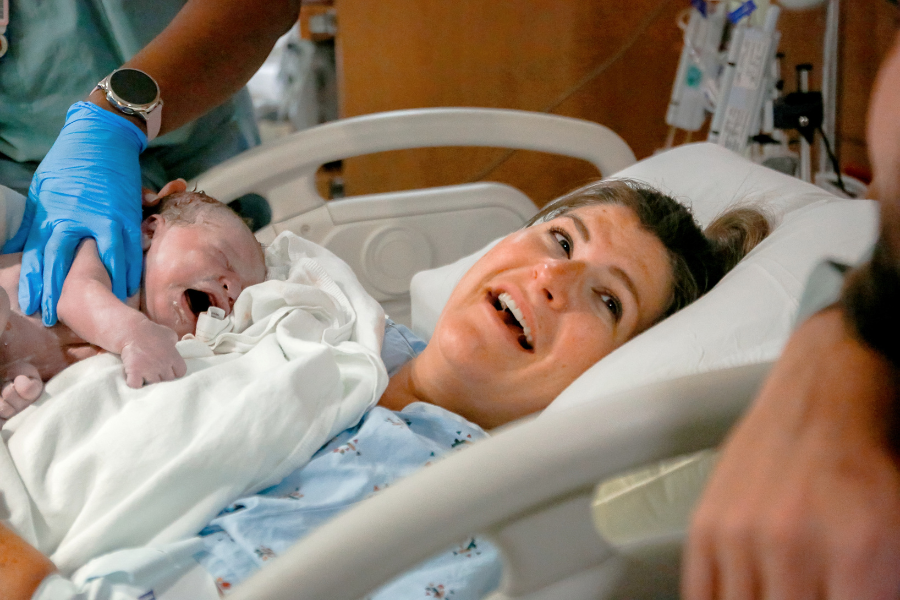Curious about precipitous labor? Let’s chat, mama!
In short, precipitous labor is when a baby is born within 3 hours of the start of regular contractions.
Which is seriously FAST! And labor that quick doesn’t come without some risk factors – but we’ll get into that more in a sec.
But I know that if you are pregnant, there’s a good chance that everybody (and their mother) has been telling you their birth story…
Occasionally, it’s a positive one, but why does it feel like it’s more often some 36+ hour event? Or one where they barely made it to the hospital?
Well, I know better than anyone how those stories can really get your mind racing about how your own birth is going to unfold.
So, with that in mind, today we’re going to discuss all things precipitous labor. This way, if a super-fast labor does happen to you, you’ll know exactly what you’re in for – and hopefully, make it to the hospital!
Follow @mommy.labornurse on Instagram to join our community of over 650k for education, tips, and solidarity on all things pregnancy, birth, and postpartum!
What is precipitous labor?
So, like I said in the beginning, precipitous labor (also called precipitous delivery) by medical definition is a labor where baby is born within 3 hours of regular contractions starting. Some experts consider precipitous labor to be any labor and birth under 5 hours.
What do I mean by the start of “regular” contractions? Basically that they are coming at similar intervals and in a predictable pattern (for example, every 5 minutes, and lasting for 1 minute). It’s from that start of regular contractions that we are timing your labor for the term “precipitous”.
Some precipitous labors will start with regular contractions, but some mamas might actually have what feels like one constant contraction with very little or no breaks in between, right from the start. We’ll get into more of this in a minute.
Average labor?
So now that you know a precipitous labor is when baby is born within 3-5 hours of regular contractions, you may be wondering what an average labor is like.
This is actually a more difficult question to answer! And this is because labor timelines can vary so much from woman to woman, and even from birth to birth.
The generic answer is that an average labor for a first-time mom can last anywhere from 6-30 hours and still be considered “normal”. For subsequent births, an average labor falls in the 6-15 hour category.
The stages of labor
To really understand the timeline of an average labor (and a precipitous labor for that matter!) an overview of the four different stages of labor is helpful!
This is how it breaks down:
- Stage 1: Contractions (Early 1-4 cm, Active 4-7 cm, Transition 7-10 cm)
- Stage 2: Pushing and birth
- Stage 3: Delivering the placenta
- Stage 4: The first 1-2 hours postpartum
So that means, how long you spend in each stage impacts your overall labor time. And for mamas who experience precipitous labor, they rip right through the first and second stages at a far faster pace.
This might seem like a dream, but it actually comes with some serious negatives for a lot of moms.
Related: An In-Depth Look at the 4 Stages of Labor
What causes precipitous labor?
While experts don’t know for sure why precipitous labor happens, they have three strong assumptions:
- An abnormally low resistance of the soft pass of the birth canal: In other words, it’s easier for the cervix to dilate and baby to move on down
- Abnormally strong uterine and abdominal contractions: In other words, your body is just getting sh*t done fast
- The absence of painful sensations: This is the rarest possibility, but it does happen! Some women do not experience pain with their contractions, and don’t know they are giving birth until they feel the pressure of baby coming out
Who is this likely to happen to?
So that probably has you wondering, is there a way to know if this will happen to you? Unfortunately, not really, as it’s difficult to point to definite risk factors.
There are some variables that may make you more susceptible to a precipitous labor, but it doesn’t mean it’s definitely going to happen to you! I don’t want you to put too much stock in this.
While this isn’t an officially recorded birth stat for the National Vital Statistics Report (it was removed in 2015!). Estimations are that it occurs in somewhere between .1% and 3% of all births.
Nevertheless, here are the possible risk factors:
- This is not your first vaginal birth
- You’ve had a past precipitous labor
- You are younger than 20
- Your baby has a low birth weight
- You have preeclampsia or gestational hypertension
But again – having one or more of these factors in play doesn’t mean you’ll definitely have a precipitous labor. And on the flip side, you could have a precipitous labor without any of these being true!
Signs of precipitous labor
Now that you know there’s not a great way to predict it will happen, how will you know if it’s happening to you? You don’t want to be that mama that’s giving birth in the car if you can prevent it, amirite?
Symptoms of precipitous labor:
- Sudden onset of very strong contractions that are very close together. One might happen right after the other will very little rest or recovery in between
- Intense pain that feels like one long contraction
- Suddenly feeling the urge to push without warning! This can feel like pelvic pressure or simply the feeling like you have to poop
What should I do if I think (or know!) I’m experiencing precipitous labor?
If your labor begins with one of the above scenarios, get in the car and go to the hospital! We’d much rather check you and send you back home, than have you deliver in the car or unintentionally at home.
If getting in the car isn’t possible because you already feel the urge to push, call 911 and let them know you are about to have a baby.
911 operators can connect your partner with a medical professional that can actually talk them through it!
Here are some things to do if baby is coming and you are not at the hospital:
- Lay on your left side, this *may* slow contractions and promotes good blood flow to baby
- Try to stay in a clean of location, if possible
- Always keep someone with you. If you are alone, call someone that could be there as fast as possible
- Use breathing techniques to reduce anxiety and help with the pain
- Trust your body, and trust that help is on the way!
I KNOW that this isn’t a scenario any mama wants to be in, but the fact is that it does happen – and I want you to be prepared if it does.
Does precipitous labor pose unique risks or complications?
Earlier I mentioned how precipitous labor might sound desirable to some women, but most that have experienced it say that it is far from enjoyable.
Precipitous labor does come with an increased risk for certain complications and can often result in birth trauma.
Let’s take a look at the possible complications:
- Higher instances of placental abruption
- Higher instances of shoulder dystocia
- Increased risk of postpartum hemorrhage
- Increased risk of tearing and laceration
- Increased possibility of retained placenta
- Risk of birth trauma that leads to postpartum mental health challenges
Related: What is Birth Trauma?
Precipitous birth stories
I know that at the beginning of this article I made a joke out of all those crazy birth stories you’re hearing about. But, I do want to say that birth stories can be a wonderful way to prepare for birth.
This is especially true if you are listening to birth stories that were recorded with intention and not unsolicited in the grocery store. It also helps to have control over when and where you’re hearing them, hah.
Here are a few precipitous birth stories from the Mommy Labor Nurse Podcast:
- EP96: Tess Shares the Story of her VERY Precipitous Labor
- EP84: Kim Perry’s Three Very Different Birth Stories (her third birth was pretty dang fast!)
Related: The Best Podcasts for Pregnancy
The bottom line
Whether precipitous labor sounds like a dream or your worst nightmare, I hope you at least have a better understanding of what it’s all about!
You should be ready to spot the signs that it might be happening and act fast to get to where you plan to deliver. Know that in the event of precipitous labor, it can be difficult to get an epidural but might be possible.
Focus on your breathing and relaxation, and know that you CAN do this mama!





